
|
"The Time Has Come"
Martin Luther King, Jr. Day, 2009
For Sunday January 25, 2009
Lectionary
Readings (Revised Common Lectionary, Year B)
Jonah 3:1–5, 10
Psalm 62:5–12
1 Corinthians 7:29–31
Mark 1:14–20
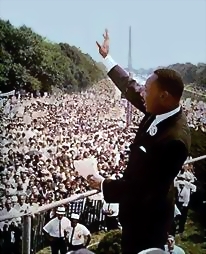 |
King's "I Have a Dream" speech, August 28, 1963, in Washington. |
Because of tornado warnings and torrential rains the night of April 3, 1968, only 2,000 people rallied at the Mason Temple in Memphis to support Martin Luther King, Jr. (1929–1968) in the strike planned by the city's sanitation workers. Three weeks earlier, King had spoken to 14,000 supporters in the same cavernous venue. Despite asking Ralph Abernathy to speak in his place, at about 9:30 PM King addressed the faithful few.
In an eerie evocation of his past that foreboded his future, he reminisced how he had nearly died in 1958 when a deranged woman stabbed him in a Harlem book store. He then related how on his flight from Atlanta to Memphis that morning a bomb scare caused the pilot to announce to the passengers that a threat to King's life necessitated a special guard on board. King continued:
And then I got into Memphis, and some began to say the threats — or talk about the threats — that were out, what would happen to me from some of our white sick brothers. Well, I don't know what will happen now. We've got some difficult days ahead. But it doesn't matter with me now, because I have been to the mountaintop. And I don't mind. Like anybody I would like to live — a long life — longevity has its place. But I'm not concerned about that now; I just want to do God's will....So I'm happy tonight! I'm not worried about anything! I'm not fearing any man! Mine eyes have seen the glory of the coming of the Lord!
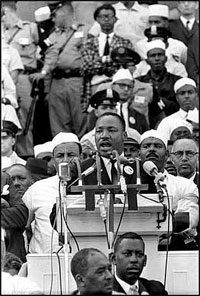 |
Click here to read King's "I Have a Dream" speech. |
At 6:01 PM the next day, escaped convict James Earl Ray assassinated King on the balcony of the Lorraine Motel. He was 39. Riots in more than 60 cities ensued. On April 8, more than 300,000 people attended his funeral. [FN: Taylor Branch, At Canaan's Edge: America in the King Years, 1965–68 (New York: Simon and Schuster, 2006)].
Part of King's many-faceted genius was his recognition that chronos, mere clock time — the passage of days, weeks, and years, no matter how long or short, no matter how trivial or important — is no match for kairos, that unique or opportune moment of God's visitation. Longevity, length of days, is a pale imitation and sad substitute for a decisive choice at a critical moment, however short the time.
In the Gospel this week Mark begins his story of Jesus with a stunning announcement. "After John was put in prison, Jesus went into Galilee, proclaiming the good news of God." In Mark's account these are the very first words spoken by Jesus. And what, exactly, was this "good news of God" that he announced? "The kairos has come. The kingdom of God is near. Repent and believe the good news!"
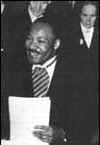 |
December 10, 1964, accepting the Nobel Peace Prize |
The Greek word kairos denotes a critical juncture, a divine appointment or intervention, in contrast to prosaic chronos or everyday "clock time." You might yawn at chronos, and forget whether it is Wednesday or Thursday, but kairos provokes a radical response, an urgent choice, or a fundamental reorientation.
In announcing "the good news of God" Jesus identified the coming of God's reign with his own person, which is why he then he invited Simon Peter and his brother Andrew, "Come, follow me." Mark is unambiguous about their unequivocal response: "At once they left their nets and followed him." And if that did not sufficiently punctuate his point, Mark then adds that "when they had gone a little farther" Jesus called a second set of brothers, James and John, who were at work in their boats. They too left everything at once to follow Jesus — their father, the hired help, the boat and their nets.
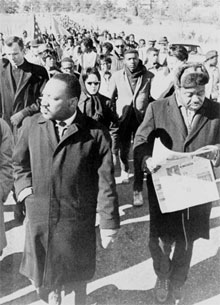 |
From Selma to Montgomery, Alabama (1965). |
Jesus proclaimed that "God's kairos has come and His kingdom is near. Repent and believe." In this week's epistle, written about thirty years after Jesus, Paul used remarkably similar language in his letter to believers in Corinth: "The kairos is short...this world in its present form is passing away." Scholars debate what Paul meant when he said that "the time has been shortened" — perhaps that death was imminent, that he believed Jesus was to return soon, or that he was alluding to specific matters at Corinth.
Whatever he meant, there's no ambiguity in the response he urged due to the crisis of the kairos. He cautioned against any postponement, entanglements, or distractions. He eliminated any middle ground and called for an either/or decision. The married, the mourning, the exuberant, the buyers and sellers should all live "as if" the normal canons of chronos did not adhere. The fulfillment (Jesus) and foreshortening (Paul) of God's kairos meant that one should no longer live life "business as usual." The kairos of God's coming in Jesus should elicit a radical revolution in life's priorities.
Throughout the Bible, marginal people connect with Jesus's urgent invitation — the religiously suspect, social outcasts, the economically poor, and the morally impure, whereas the smug "establishment" sorts often miss it, don't believe it, or choose not to hear. In the Old Testament reading this week, the most improbable converts, the pagan Ninevites, understood the kairos of God. Much to Jonah's shock and chagrin, these "foreigners" responded to his preaching, repented, and believed his message about Yahweh.
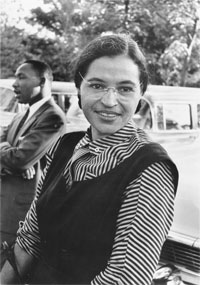 |
Rosa Lee Parks in 1955 with MLK in the background. |
December 1, 1955 dawned like any ordinary day of chronos, except that a seamstress and civil rights activist named Rosa Lee Parks (1913–2005) sensed the moment of God's kairos. After a long day of work at Montgomery Fair department store, she boarded the Cleveland Avenue bus and refused the driver's demand to relinquish her seat to a white passenger. Parks understood the fleeting nature of transient chronos, and the limited opportunities we have to choose risk over regret, and urgency over complacency. In her autobiography, Rosa Parks: My Story, she explained her motivation that December evening: "I was not old, although some people have an image of me as being old then. I was forty-two. No, the only tired I was, was tired of giving in." Her solitary act provoked the Montgomery bus boycott, propelled a 26-year old year old Martin Luther King, Jr. into the forefront of the civil rights movement, and became an iconic moment of kairos in American history.
The Psalmist this week observes the leveling effect of chronos, that whether one is born a pauper or a prince, "together they are only a breath" (Psalm 62:9). Like smoke that dissipates from a room, at some point in the not too distant future, your past, present and future, the duration or passage of chronos you have enjoyed, will come to an abrupt end. Until then, following in the footsteps of King and Parks, God's kairos invites us to seize the opportune moment or appointed time to enter His kingdom.
For further reflection:
* What might the invitation of Jesus or the urgency of Paul mean for you?
* When have you experienced moments of kairos that interrupted chronos?
* What in your mind are the major contributions of King and Parks?
* Think about it: risk something big for something good.
Image credits: (1) NostalgiaCentral.com; (2) AmericanRhetoric.com; (3) d@dalos, International UNESCO Education Server for Civic, Peace and Human Rights Education; (4) AmericasLibrary.gov; and (5) Wikipedia.org.





